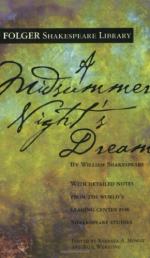|
This section contains 2,069 words (approx. 7 pages at 300 words per page) |

|
SOURCE: Hamilton, Sharon. “Daughters Who Rebel: Hermia (A Midsummer Night's Dream), Jessica (The Merchant of Venice), and Desdemona (Othello).” In Shakespeare's Daughters, pp. 38-42. Jefferson, N.C.: McFarland & Company, Inc., 2003.
In the following excerpt, Hamilton analyzes the father-daughter conflict between Egeus and Hermia in a A Midsummer Night's Dream.
In A Midsummer Night's Dream, the father-daughter conflict is presented in its simplest terms. Old Egeus sounds his character note at his first appearance. He comes in “full of vexation … with complaint / Against [his] child” (I.i.22-23). The reason is suggested in the cast list: Hermia is identified as “daughter to Egeus, in love with Lysander.” The problem is that Egeus favors Demetrius, and has given him his consent. Lysander, Egeus claims, has “bewitched” Hermia, “filched [his] daughter's heart” with “rhymes,” “love tokens,” “verses of feigning love,” “bracelets of his hair, rings, gauds, conceits, / Knacks, trifles, nosegays, sweetmeats...
|
This section contains 2,069 words (approx. 7 pages at 300 words per page) |

|


